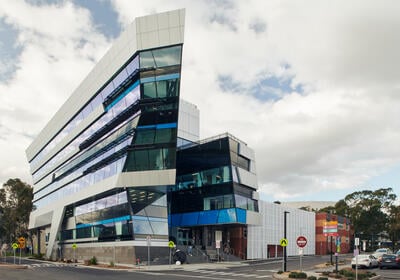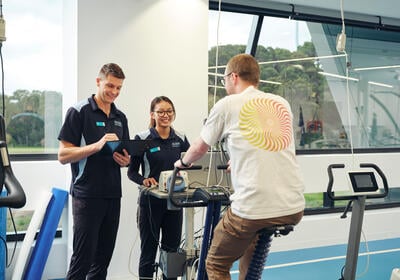
How elite facilities enrich your learning
Learn in world-class facilities from day one and kickstart your journey to a fulfilling career in exercise physiology.
A Master of Clinical Exercise Physiology at Deakin puts students on the fast track to an impressive career in healthcare. Hear from Matt Pollard, a graduate from the first cohort to complete the program.
After graduating as part of the Master of Clinical Exercise Physiology’s very first cohort in 2012, Matt Pollard has gone on to achieve some impressive feats in the field of exercise physiology.
Over the past decade, he’s held roles on the Exercise and Sports Science Australia (ESSA) Exercise Physiology Advisory Group and he’s the current chair of the ESSA Victorian Chapter. He has also acted as a committee chair for Deakin University’s Course Advisory Committees for both the Bachelor of Exercise and Sports Science and the Master of Clinical Exercise Physiology.
Today, Matt is the Manager of Exercise Services at Rise Health Group, an Accredited Exercise Physiologist at Rise Health Group and Foot and Ankle Rehabilitation Australia and a casual academic at Deakin.
Like many of our graduates, Matt connected with his first employer, Rowville Sports Medicine and Rowville Physiotherapy, via one of his student placements.
'They put me on as an exercise scientist while I finished my degree. And then once I was qualified as an exercise physiologist, I stayed on. I was working at the time mostly in sports strength and conditioning, high performance sort of work,' says Matt.
'I then progressed through to a mostly rehab focus after I graduated. The company rebranded and joined with another brand, so it's now Rise Health Group and Foot and Ankle Rehab Australia. I’ve worked for them ever since.'
Within my career, there have been multiple times that people have told me I've changed their lives. That's pretty remarkable and it's pretty amazing to get to hear that sort of thing.
Matt Pollard
Manager of Exercise Services and at Rise Health Group and Accredited Exercise Physiologist
Matt has a special interest in foot and ankle rehab and currently works across five different locations. Each day brings new challenges as he works closely with orthopaedic surgeons on a range of pre-op, post-op and preventative care.
'My days are highly varied... that might mean working in the surgeon's rooms, out of a hospital because [the surgeon] happens to be there as well, or in our primary location in Melbourne. We've got a beautiful rehab facility where we can supervise and progress [patients’] exercises using all the rehab gear,' says Matt.
'They'll have the surgery and there's the more immediate post-op care, and then they'll come to me a little bit later on to return to function, return to life, return to sport, whatever that is.'
As well as his clinical work and casual teaching role at Deakin, Matt’s also collaborating on a Deakin research project exploring the possibility of rewriting Achilles rupture repair protocols. It’s an area of personal interest for Matt, who ruptured his own Achilles playing basketball.
'We think it can be done better than it currently is, and we'd love to prove it through research. So we've got a few of the guys there at Deakin that have put together a project for us,' he says.

Learn in world-class facilities from day one and kickstart your journey to a fulfilling career in exercise physiology.
One of the big draw cards to work in exercise science is the opportunity to build rapport with clients says Matt, using exercise to treat their illness, injury or disease. The exercise component is teachable, he says, but it’s the people skills that are critical to success.
His clients agree. Samantha Ferdinands had just experienced her fifth episode of exercise-induced anaphylaxis in 2015 when she started working with Matt.
'I 100% expected him to hear my story and say, "Sorry, we can’t help you"... but Matt said, "We can do this." That’s where the partnership started,' she says.
'Over time we built up my capacity... built up my strength as well as the mental side of things. At times I would pull back out of fear or anxiety but Matt has been there to support me.'
Samantha says Matt takes a holistic view of his patients.
'Matt just goes to the next level, not only supporting my fitness journey but also the mental journey. He’s there if you need him and he wants the best for everybody.'
Alyse Cahill first met Matt as part of a lower limb rehab class as she prepared for hip surgery in 2017. He’s been her exercise physiologist ever since.
'It’s allowed me to carry on like the young person that I am, rather than feeling like I’m trapped in an old person’s body,' says Alyse.
Matt has not only helped Alyse keep her hip strong but has also been a valuable support person throughout a range of challenges.
'I have chronic health problems and he’s really good at not only supporting me on the exercise physiology side of things but also as a person.'

The hallmark of any great course is its graduate employability rates. Deakin's Master of Clinical Exercise Physiology was specially designed by accredited exercise physiologists with this in mind.
As a Master of Clinical Exercise Physiology graduate – and now an academic himself – Matt found the teaching team at Deakin a model example of how to relate well to clients, a skill he’s found invaluable in the intervening 10 years in the field.
'I've stayed involved with Deakin because of the quality of people that I got to know through that time... there's a shared drive to be the best versions of ourselves,' says Matt.
'The people that continue to lead [the course] set a wonderful example in that space in terms of how giving and caring they are with their time,' says Matt.
'They were great role models for us to replicate when we entered the field.'
Matt’s seen the industry come a long way in the past 10 years and says the scope of practice and range of opportunities available to accredited exercise physiologists is ‘massive’.
For Matt, his drive from the beginning was to specialise as a musculoskeletal rehabilitation clinician, helping clients return to work and sport.
'I remember graduating and I was chatting to one of my mentors about how I was going to go into physiotherapy in order to work in musculoskeletal care... and he said to me at the time, "If you make yourself good enough at what you do, you'll never look for work again." That really stuck with me,' says Matt.
'Within my career, there have been multiple times that people have told me I've changed their lives. That's pretty remarkable and it's pretty amazing to get to hear that sort of thing.'
Who should pursue exercise physiology? Matt believes if you love what you do, you’ll never work a day in your life. His best advice to students considering becoming an accredited exercise physiologist?
'If you love genuinely helping people achieve great things, then I think it's an amazing career.'
Want to follow in Matt’s footsteps? Take your first step with Deakin.